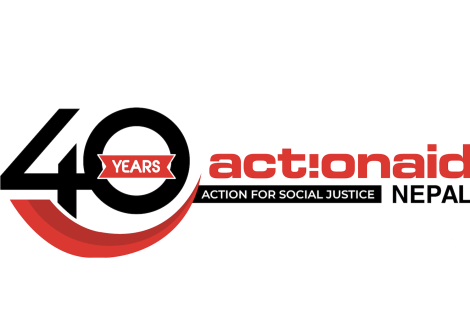40 years of empowering communities: ActionAid’s journey towards social justice

40 years of empowering communities: ActionAid’s journey towards social justice
Celebrating 40 years of impact and change! ActionAid Nepal's journey has been one of resilience, empowerment, and advancement. Saroj Pokhrel and Narayan PD Sitaula share their journey throughout the years.
At ActionAid, we highly value partnerships built on the principles of equality and respect, where shared values guide our collaborative efforts. We firmly believe in the power of partnerships, recognizing the crucial role that communities, partners, and various stakeholders play in driving transformative change within the communities we serve. We view ourselves as facilitators, understanding that real impact can only be achieved when communities take ownership of the process and drive the initiative. The voices of those facing challenges should be at the forefront, raising awareness and advocating for their rights. That's why we emphasize building partnerships with communities, using participatory approaches to earn their trust, address their concerns, mobilize them, amplify their voices, and foster solidarity to resolve their issues and ensure they receive their rightful entitlements as citizens. Consequently, garnering widespread support and collaborating with like-minded organizations are crucial in holding duty bearers accountable and guiding them in addressing the concerns of the people they serve. Effective communication is vital throughout the program cycle to raise awareness, foster solidarity, engage communities and supporters, and ensure a participatory process. Sustainable impact can only be achieved when an issue or agenda becomes a shared concern, prompting people to take ownership and work towards justice. We believe that the communities we serve should experience the change or impact directly and be an integral part of our efforts. We don't simply claim impact based on reporting processes; instead, we center our work around feminist principles, placing the rights of people living in poverty and facing exclusion at the core of everything we do. ActionAid operates within a federal structure, allowing countries to set their own priorities while aligning them (partially or fully) with the global strategy of ActionAid International. Countries prioritize issues and campaigns based on their specific contexts, and interventions are planned and executed accordingly. To collectively raise voices on global issues, countries implement interventions aligned with their planned activities. They may also develop their own program intervention plans and campaigns, working independently but with communities as the driving force in addressing issues and concerns. To ensure effective communication, we develop comprehensive communication, monitoring, and evaluation plans that convey authentic information while considering branding and visibility. Through periodic community and cluster reviews, we provide opportunities for communities to share their perspectives on the program approach and the changes they have experienced. We also encourage feedback and opinions during partners' annual social audits, capturing the voices of communities and stakeholders through various communication channels, social media platforms, and our global communication team. By involving local communities in the planning process and aligning global perspectives with local contexts, we enable communities to prioritize issues based on their importance and sensitivity.
ActionAid's primary communication focus is amplifying the agenda of impoverished and marginalized communities, ensuring their voices are heard and their concerns are addressed. We actively engage with different levels of government to develop and amend policies that better serve these communities, aiming to ensure their rights are respected, protected, and fulfilled at all levels. In the past, we have organized dialogue forums to engage policymakers in constructive debates about policy gaps and the way forward. Drawing from our past experiences, we have collaborated with government counterparts to enhance technical capacity in key areas that require attention. We strive to make public services more accessible and gender-responsive, and we have made significant progress in that regard. These various processes create an enabling environment for prioritizing identified issues within government plans and policies.
ActionAid has been working in Nepal since 1982, and our success is largely attributed to the indispensable role played by our partners and communities. By partnering with people living in poverty and exclusion, we have recognized the importance of shifting power dynamics in their favor. This realization led us to form groups that actively participate in savings and credit initiatives, empowering themselves and mobilizing their communities to tackle shared issues and challenges. To capture the voices and stories of communities and frontline workers, both our partner staff and ActionAid personnel play a critical role in regularly documenting evidence that demonstrates the positive changes in the lives of the people we work with. We conduct periodic evaluations of program areas, seeking anecdotes, stories, and the perspectives of government authorities and other stakeholders. During organizational events, we prioritize the voices of community members, enabling them to share their reflections and experiences regarding our program interventions. These stories and anecdotes are shared through various communication platforms, showcasing our efforts to transform the lives of communities and individuals. ActionAid is widely recognized as a human rights-based organization. In Nepal, we have pioneered the REFLECT Circle and organized social audits, garnering admiration for these initiatives. We rely on these processes to showcase the quality of our work. However, measuring program impact and assessing empowerment are challenging tasks that require collective efforts. ActionAid acknowledges that impactful results require collaboration among many individuals and organizations, networks, and alliances. Positive change is brought about through a collective and mindful endeavor, where lessons are learned from both successes and failures. Through our interventions, we have witnessed activists, staff members, community group facilitators, and beneficiaries rising to leadership positions within local government organizations, some even attaining regional and national roles. This success speaks to ActionAid's ability to adapt and integrate valuable lessons and experiences, influencing our identity and priorities in a positive way. Our approach to activism and social mobilization is grounded in praxis mode, where we take action, reflect, learn, and strategize to improve our work. Learning from both successes and failures is essential in our continuous efforts to create a meaningful impact.
Narayan Pd. Sitaula is a highly accomplished professional leading the Organizational Impact and Communication department at ActionAid Nepal. With a robust background in strategic planning and communication, Narayan brings a wealth of experience to his role, fostering positive change and creating substantial impact within the organization. His expertise lies in designing and executing innovative communication strategies that effectively engage stakeholders and raise awareness about critical social issues. Narayan's visionary leadership and unwavering commitment contribute to ActionAid Nepal's mission of promoting social justice, equality, and sustainable development. Guided by his exceptional communication skills and a deep passion for driving social change, Narayan Pd. Sitaula continues to play a pivotal role in advancing ActionAid Nepal's mission and building a more equitable and just society.

Saroj Pokhrel, a highly regarded professional, currently holds the position of Head of Program Policy at ActionAid Nepal. With an impressive background in policy formulation and program management, Saroj brings extensive knowledge and expertise to his role. His unwavering dedication to social justice and sustainable development is evident through his strategic leadership in designing and implementing impactful programs. Saroj's visionary approach to program policy development ensures that ActionAid Nepal's initiatives align with the organization's mission and effectively address pressing social issues. With a strong commitment to empowering marginalized communities and promoting gender equality, Saroj spearheads transformative projects that bring about positive change. Leveraging his exceptional analytical skills and deep understanding of local contexts, he identifies key areas for intervention and develops evidence-based policies that create lasting impact. Through his relentless efforts, Saroj Pokhrel continues to propel ActionAid Nepal's mission, making a significant difference in the lives of vulnerable populations and contributing to the realization of a just and inclusive society.

This article was published in The Annapurna Express. (Click here to find the article link)